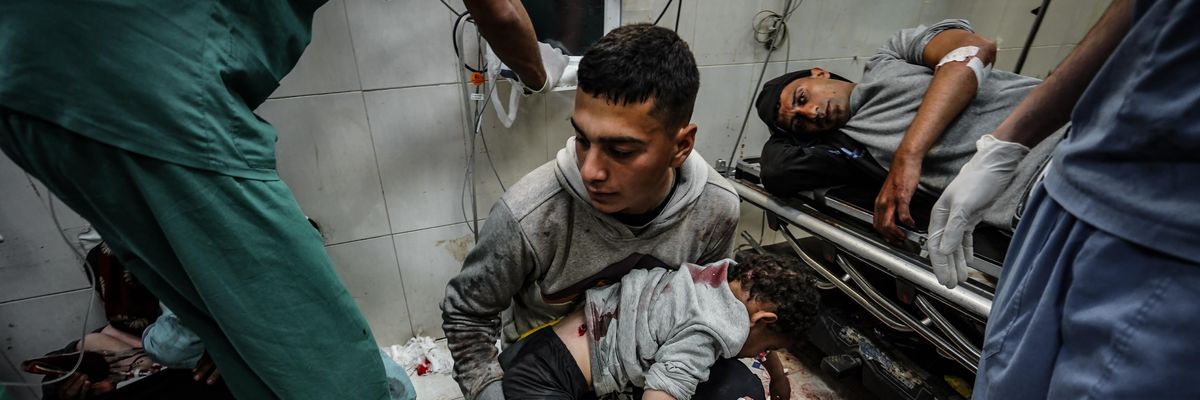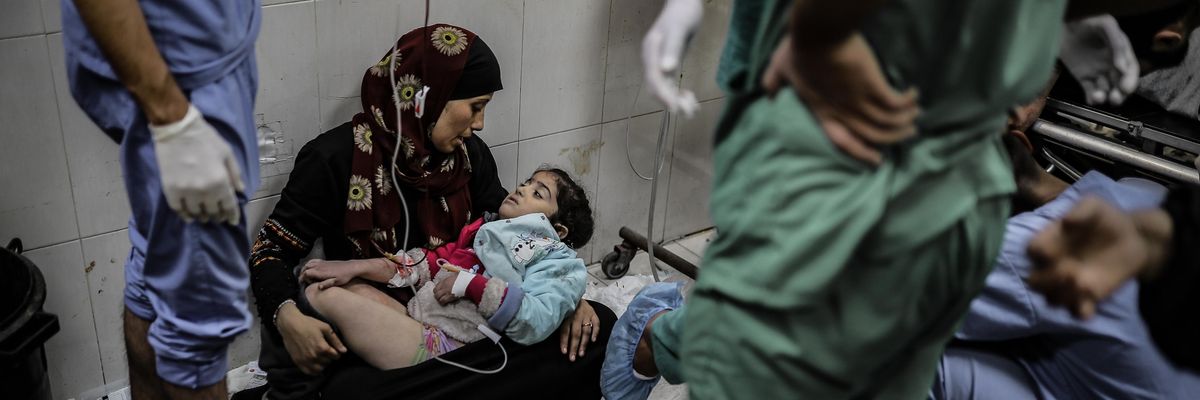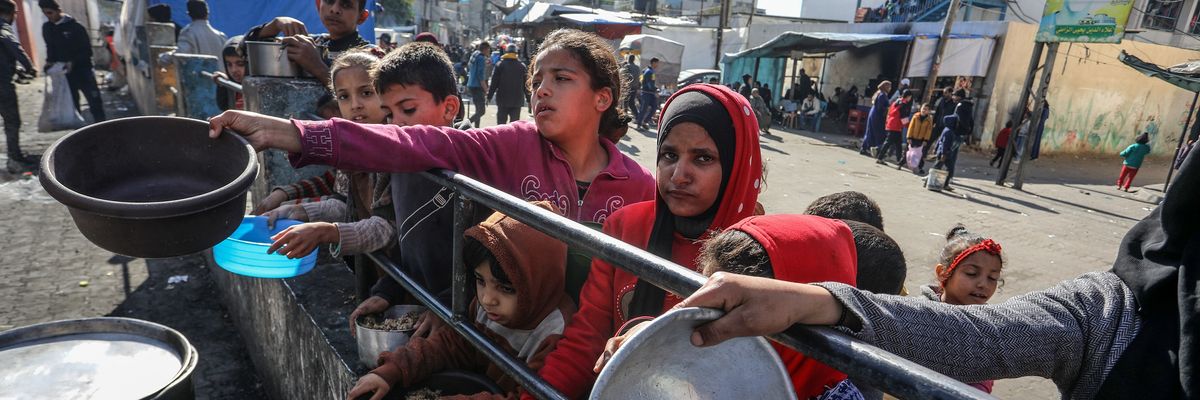The US Must Stop Arming Israel’s Assault on Hospitals
Original article by KATHY KELLY republished from Common Dreams under Creative Commons (CC BY-NC-ND 3.0).

If we can’t find the morality to stop, we may find we have created a world in which no one can count on upholding basic human rights.
Many decades ago in Chicago, my favorite of several part-time student jobs was operating the “old-style” telephone switchboard at a small hospital called Forkosh Memorial. The console of coils and plugs included a mirror so operators could keep an eye on the hospital entrance, which on weekends and evenings was also monitored by an elderly, unarmed security guard named Frank. He sat at a classroom style desk near the entrance with a ledger book.
Over the course of four years, on weekends and evenings, “security” at the hospital generally consisted solely of Frank and me. Fortunately, nothing much ever happened. The possibility of an attack, invasion, or raid never occurred to us. The notion of an aerial bombardment was unimaginable, like something out of War of the Worlds or some other sci-fi fantasy.
Now, tragically, hospitals in Gaza and the West Bank have been attacked, invaded, bombed, and destroyed. News of additional Israeli attacks is being reported on a daily basis. Last week, Democracy Now! interviewed Dr. Yasser Khan, a Canadian ophthalmologist and eye surgeon who recently returned from a humanitarian surgical mission at the European Hospital in Khan Younis in Gaza. Dr. Khan spoke of bombings taking place every few hours resulting in a constant influx of mass casualties. The majority of patients he treated were children from age 2 to 17. He saw horrific eye injuries, shattered faces, shrapnel wounds, abdominal injuries, limbs severed above the bone, and traumas caused by drone-launched laser-guided missiles. Amid the overcrowding and chaos, healthcare workers tended to patients while lacking basic equipment, including anesthesia. Patients lay on the ground in unsterile conditions, vulnerable to infection and disease. Most of them also suffered from severe hunger.
At Forkosh Hospital in the 1970s, I had a mirror to see what was happening behind my back, but everyone on Earth can see, directly, the horror of U.S. support for a genocidal event happening on our watch.
Normally, a child who undergoes an amputation faces as many as 12 additional surgeries. Khan wondered who would do the follow-up care for these children, some of whom have no surviving relatives.
He also noted sniper fire prevented doctors from going to work. “They’ve killed healthcare workers, nurses, paramedics; ambulances have been bombed. This has all been systematic,” Khan explained. “Now there are 10,000 to 15,000 bodies decomposing. It’s the rainy season right now in Gaza, so all the rainwater mixes with the decomposing bodies and that bacteria mixes with the drinking water supply and you get further disease.”
According to Khan, Israeli forces have kidnapped 40 to 45 doctors, specifically targeting specialists and hospital administrators. Three healthcare professional organizations have issued a statement expressing deep concern that the Israeli military has abducted and unlawfully detained Dr. Khaled al-Serr, a surgeon at the Nasser Hospital in Gaza.
On February 19, WHO Director-General Dr. Tedros Adhanom Ghebreyesus described conditions in the Nasser hospital after Israel ordered evacuation of Palestinians from the complex. “There are still more than 180 patients and 15 doctors and nurses inside Nasser,” he said. “The hospital is still experiencing an acute shortage of food, basic medical supplies, and oxygen. There is no tap water and no electricity, except a backup generator maintaining some lifesaving machines.”
Eight years ago, in October of 2015, the United States military destroyed Afghanistan’s Kunduz hospital, run by Médecins sans Frontières (Doctors Without Borders). For more than an hour, a C-130 transport plane repeatedly fired incendiary devices at the hospital’s emergency room and intensive care unit, killing 42 people. Thirty-seven additional people were injured. “Our patients burned in their beds,” read the MSF’s in-depth report. “Our medical staff were decapitated or lost limbs. Others were shot from the air while they fled the burning building.”
The horrific attack outraged war resisters and human rights groups. I remember joining a group of activists in upstate New York who assembled outside a hospital emergency room with a banner proclaiming, “To bomb this site would be a war crime.”
In 2009, on a smaller, yet still horrific scale, I witnessed an Israeli onslaught in Gaza called “Operation Cast Lead.” In the emergency room of the Al Shifa hospital, Dr. Saeed Abuhassan, an orthopedic surgeon, described experiences similar to Khan’s. This surgeon grew up in Chicago, very close to the neighborhood where I lived. I asked him what he would want me to tell our neighbors back home. He listed a litany of horrors, and then he stopped. “No,” he said. “First, you must tell them that U.S. taxpayer money paid for all of these weapons.”
Taxpayer money feeds the bloated, swollen Pentagon budget. U.S. Senators, last week, cowed by AIPAC, decided to send Israel an additional $14.1 billion to boost military spending. Only three Senators voted against the bill.
From Palestine, Huwaida Arraf, a Palestinian-American human rights attorney, wrote on X: “The scary part is not that Israel is planning the forcible transfer of the Palestinians it hasn’t slaughtered, but that the so-called ‘civilized world’ is allowing it to happen. The ramifications of this coordinated evil will haunt its collaborators for generations to come.”
At Forkosh Hospital in the 1970s, I had a mirror to see what was happening behind my back, but everyone on Earth can see, directly, the horror of U.S. support for a genocidal event happening on our watch. Gravely distorted versions of what occurred on October 7, cannot—even if believed—justify the scale of the horrors being reported in Gaza and the West Bank each day.
The U.S. government continues enthusiastically to bankroll Israel’s systemic and inhumane destruction of Gaza. U.S. advisers make feeble attempts to suggest Israel should pause or at least try to be more precise in their attacks. In its quest for hegemonic superiority, the United States tears into ever tinier shreds whatever remains of a commitment to human rights, equality, and human dignity.
What kept Forkosh Hospital secure, decades ago, was a social contract that presumed safety for a small hospital serving the local population.
If we can’t find the morality to stop supplying weapons for ongoing Israeli onslaughts against Gaza and its places of healing, we may find we have created a world in which no one can count on upholding basic human rights. We may be creating intergenerational wounds of hatred and sorrow from which there will never, ever be any safe place to heal.
A version of this article first appeared on The Progressive website.
Original article by KATHY KELLY republished from Common Dreams under Creative Commons (CC BY-NC-ND 3.0).
- Behind Israel’s Brutal Genocidal Attack On Gaza Stand Joe Biden And Congress ›
- ‘Can You Hear The Screams?’ Physician Says Western Leaders Complicit In Israeli Attacks On Gaza Hospitals ›
- Gaza Death Toll Continues To Rise As US Refuses Global Call For Cease-Fire ›
- UK Union Workers Blockade Plants Arming Israel ›
- Maine Protest Urges General Dynamics To ‘Stop Arming Israel’s Genocide’ ›


